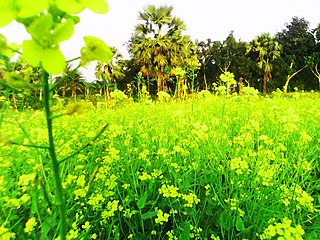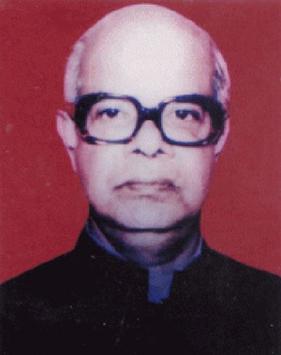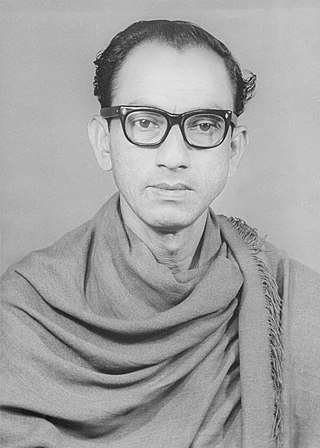Related Research Articles

The Bangladesh Armed Forces are the combined military forces of the People's Republic of Bangladesh. It consists of the three uniformed military services: the Bangladesh Army, the Bangladesh Navy and the Bangladesh Air Force. The Armed Forces are under the jurisdiction of Ministry of Defence of the Government of Bangladesh, and is directly administered by the Armed Forces Division of the Prime Minister's Office. The President of Bangladesh serves as the Commander-in-Chief of the Bangladesh Armed Forces. It has the third-largest defence budget in South Asia and according to the Global Firepower index it is the third most powerful military force in South Asia. Border Guard Bangladesh and Bangladesh Coast Guard are under the jurisdiction of the Ministry of Home Affairs during peacetime, but during wartime they fall under the command of Bangladesh Army and Bangladesh Navy respectively.
Independence of Bangladesh was declared on 26 March 1971, celebrated as Independence Day, from Pakistan. The Independence Day of Bangladesh is celebrated on 26 March when Sheikh Mujibur Rahman declared the independence of Bangladesh. The Bangladesh Liberation War started on 26 March and lasted till 16 December 1971 which is celebrated as Victory Day in Bangladesh. There is a dispute along partisan line on who declared the Independence of Bangladesh. The Awami League claim Sheikh Mujibur Rahman while the Bangladesh Nationalist Party claim it was Ziaur Rahman.

Jessore District, officially spelled Jashore District from April 2018, is a district in the southwestern region of Bangladesh. It is bordered by India to the west, Khulna District and Satkhira District to the south, Khulna and Narail to the east, and Jhenaidah District and Magura District to the north. Jessore is the capital of the district. Jessore is also the home of the ancestors of the great Bengali poet Rabindranath Tagore.

The Magura District is a district in south-western Bangladesh, situated 176 kilometers from Dhaka. It is a part of Khulna Division. The main mode of transportation is by bus, and no train transport is available.

Jashore Airport is a domestic airport in Jashore, Bangladesh. Operated and maintained by the Civil Aviation Authority, Bangladesh. It is also used by the Bangladesh Air Force as part of BAF Matiur Rahman Base and training airfield for the Bangladesh Air Force Academy. Currently it has seven daily flights to Dhaka and a weekly flight to Cox's Bazar. It is the only operational airport of the Khulna Division and the fifth busiest airport of Bangladesh.

Abdul Malek Ukil was the President of Bangladesh Awami League, Speaker of Parliament, Home Minister, Health Minister, a member of Parliament for many years and a lawyer of the Supreme Court of Bangladesh. He was one of the drafters of the Constitution of Bangladesh and also one of the founding members of East Bengal Muslim Students League.

The 1969 East Pakistan uprising was a democratic political uprising in East Pakistan. It was led by Awami League against Muhammad Ayub Khan, the president of Pakistan in protest of the Agartala Conspiracy Case and the incarceration of Sheikh Mujibur Rahman among other Bengali nationalists.

The divisions of Bangladesh are divided into 64 districts or zila. The headquarters of a district is called a district seat. The districts are further subdivided into 495 subdistricts or upazilas.
Bir Bikrom Hafizuddin Ahmed is a Bangladesh Nationalist Party politician, a retired Bangladesh Army major, and a six-term Jatiya Sangsad member representing the Bhola-3 constituency. He fought in the Bangladesh Liberation War and was awarded the third highest gallantry award in Bangladesh, Bir Bikrom, for his courage. He is also a retired footballer and one of the few from East Pakistan to have represented the Pakistan national football team.
Syed Sajjad Hussain was a Pakistani-Bangladeshi academic and writer. He served as the 4th Vice-chancellor of the University of Rajshahi.
Ahmed Ali Enayetpuri was a Bengali writer, journalist, and politician.
Raoshan Jahan Sathi is a Bangladesh Awami League politician and the former Member of Parliament from a reserved seat. She was also involved with Jatiya Samajtantrik Dal.
Rahimullah Choudhury was a Bengali industrialist and politician. He was a member of the 4th National Assembly of Pakistan as a representative of East Pakistan.
Ayesha Sardar is a Bangladesh Nationalist Party politician and the former Member of Parliament of women's reserved seat.
Asghar Hossain Zaidi was a Member of the 4th National Assembly of Pakistan as a representative of East Pakistan.
Altaf Hossain Sikdar was a Member of the 4th National Assembly of Pakistan as a representative of East Pakistan.

The Greater Jessore region predominantly includes the districts of Jessore, Jhenaidah, Narail and Magura in Bangladesh, as well as the Bangaon subdivision of India. Nestled close to the Sundarbans, the region experienced human settlement early on. It served as the capital city of the Samatata realm and passed through several Buddhist and Hindu kingdoms such as the Palas and Senas. Jessore was ruled by Khan Jahan Ali of Khalifatabad, under the Muslim Sultanate of Bengal, who is credited with establishing the Qasbah of Murali and urbanising the region through advancements in transportation and civilization. Jessore later came to be ruled by various chieftains such as Pratapaditya and became familiar to contemporary European travellers as Chandecan before being annexed to the Mughal Empire in the seventeenth century. By 1757, the British East India Company had dominated and started to establish themselves in the region. British rule lasted up until 1947, with Jessore coming under the Provisional Government of Bangladesh from 1971 onwards.

Mosharraf Hossain was a politician and lawyer from Jessore, Bangladesh. He was actively involved in the Bengali nationalist movement in East Pakistan and the Liberation War of Bangladesh in 1971.
References
- 1 2 3 আহম্মদ আলী সরদার. jessore.info (in Bengali). Retrieved 20 January 2021.
- ↑ "List of Members of the 4th National Assembly of Pakistan from 1965-1969" (PDF). na.gov.pk. Retrieved 19 January 2021.